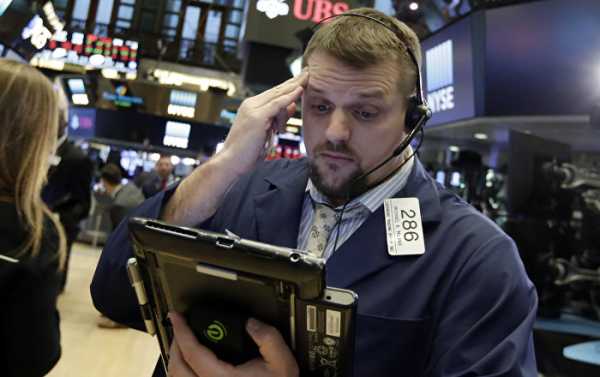
Following Donald Trump’s most recent remarks of a “real deal” still being a thing of the future, as the clock started ticking for the threatened increase in tariffs on Chinese imports, it appeared the US-China talks at the G20 are “no big leap forward”, as Trump enthusiastically put it, but merely a slight 90-day détente in the ongoing trade war.
A bit of uncertainty was registered in the currency and share markets following a controversy over what US President Donald Trump and his Chinese counterpart Xi Jinping had arrived at in the course of the side-line talks at the G20 summit in Buenos Aires on Saturday. Although on Monday there was a “relief rally” of sorts in global finances, as investors bought Trump’s triumphant rhetoric, according to The Sydney Morning Herald, the uplifted mood gave in overnight to utmost wariness.
The edition noted that due to a combination of two factors, volatility in the bond market, which has recently seen a flattened yield curve, and uncertainty about the outcomes of the US-China G20 talks and the American economy at large, investors rushed to the side-lines.
Treasury Bill Yield Curve
The caution and doubts over the long-term profits are best demonstrated by interest rates, with 2 and 3-year US Treasury bonds trading nearly the same as 10-year bonds, with the gap diminishing from day to day. For instance, according to treasury.gov, the Treasury bill yield curve at a 3-month maturity stood at 2.48 on December 4, whereas it was 2.91 in the case of 10 years remaining to maturity, which is 0.07 down from the day before. Separately, according to the Australian media outlet, the US market fell overall 3 percent in wake of the G20 summit.
Renminbi Breakthrough
Meanwhile, China’s national currency has swirled upwards more dramatically over the past couple of days than over the last decade after the second biggest economy reached a détente in its trade row with the United States. Another factor that apparently played into Chinese hands is a current decline in the dollar prices, so that the mentioned duo effectively pushed the renminbi upwards. To illustrate the case, the Chinese onshore currency has risen by 1.8 percent in price during the first two days of the week, according to Refinitiv‘s statistical data. It is the most prominent rise in a decade, since June 2005, when China freed its currency of the domestic artificial peg and placed it into a more flexible foreign exchange system.
There were notably reported conflicting versions of what transpired during the major Saturday gathering.
As was voiced by Trump on Saturday, he and his Chinese counterpart agreed at G20 that in return for the US postponing a widely covered 15 percent increase, from 10 to 25 percent, in the rate of limitations to be potentially imposed on $US200 billion worth of Chinese exports to the US for 90 days, China would okay “very substantial” purchases of US products “immediately”. He also noted that further negotiations should by all means go on in light of the imminent threat of an increase in tariffs.
Points of Controversy
Trump, who emotionally branded the deal “incredible”, went on to say that China would completely remove a 40 percent customs duty on American cars and had agreed to negotiate on contentious issues like robotics and intellectual property. However, the Chinese side has so far refrained from remarks on the deal.
Separately, the talks were differently described by Trump and his administration, with the latter, namely Trump’s senior economic adviser Larry Kudlow, putting it in a most informal way: “stuff that they’re going to look at and presumably implement”, adding that there was no specific agreement in black and white on car tariffs. Nor was there any joint statement following the meeting at large.
A separate contentious point, meanwhile, is the timeframe, specifically, the starting date of the 90-day deferment of the potential rise of tariffs from 10 to 25 percent. Kudlow told reporters Monday that the 90-day timetable would commence January 1, but the White House later issued a correction saying the timetable starts December 1.
China has so far not had its say on “immediate” purchases of US agricultural commodities, namely soybeans, which have seen a staggering 95 percent fall in Chinese purchases. Trump, meanwhile, stated after the meeting that the bilateral negotiations would focus on “whether or not a real deal with China is actually possible”, thereby suggesting that while it is all about talking for now, the deal proper to end the trade war is still ahead. “If it is [possible] we will get it done. China is supposed to start buying agricultural product and more, immediately. President Xi and I wants this deal to happen, and it probably will”.
“If it doesn’t? ‘I’m a Tariff Man’”, he wrote on Twitter, remarking on Tuesday that the negotiations had already kicked off.
In the meantime, the key meeting between the two presidents left Beijing officials “puzzled and irritated” by the Trump administration’s conduct, The Washington Post reported Tuesday, citing a former U.S. government official who has been in contact with Chinese officials.
“You don’t do this with the Chinese. You don’t triumphantly proclaim all their concessions in public. It’s just madness”, the former official, speaking about the confidential discussions on condition of anonymity, told the edition.
Most recently, the Chinese Commerce Ministry vaguely billed meeting “very successful,” adding that they “have confidence that the agreement will be implemented.”
The ties between the two countries have soured drastically after Washington announced earlier this year that $50 billion worth of Chinese goods would be subject to 25 percent tariffs in a bid to fix the US-Chinese trade deficit, which was “unfair” with regard to the United States, Trump proclaimed. Since then, the two countries have exchanged several rounds of tit-for-tat trade duties against each other.
Sourse: sputniknews.com






